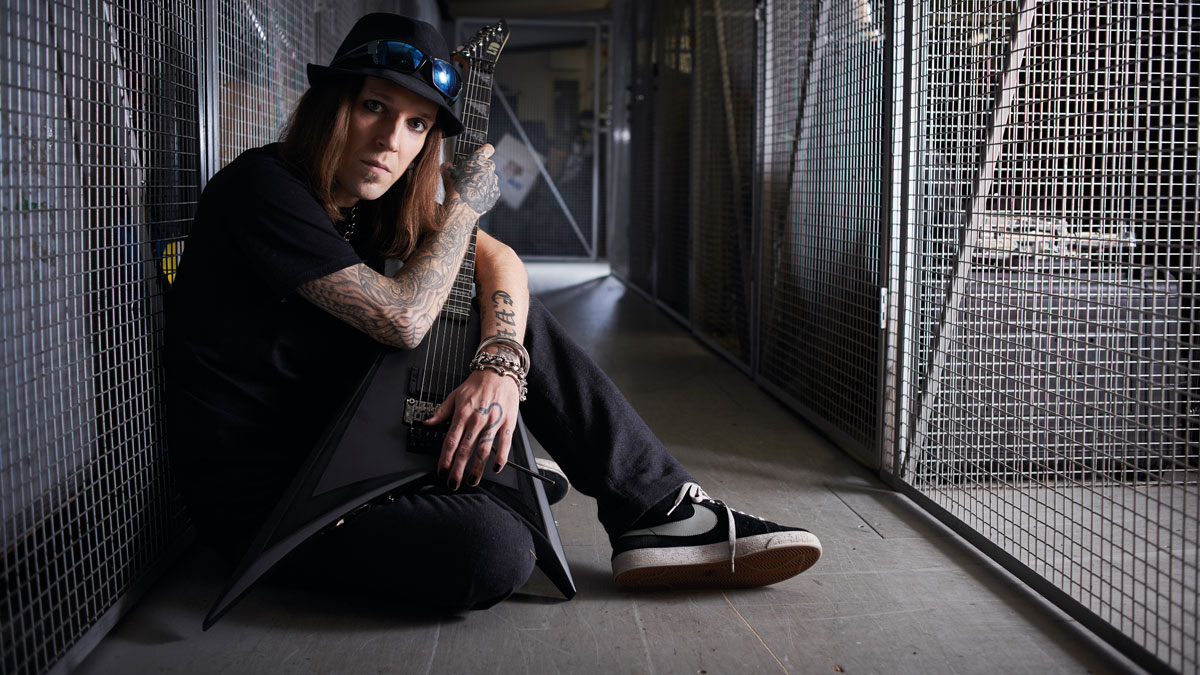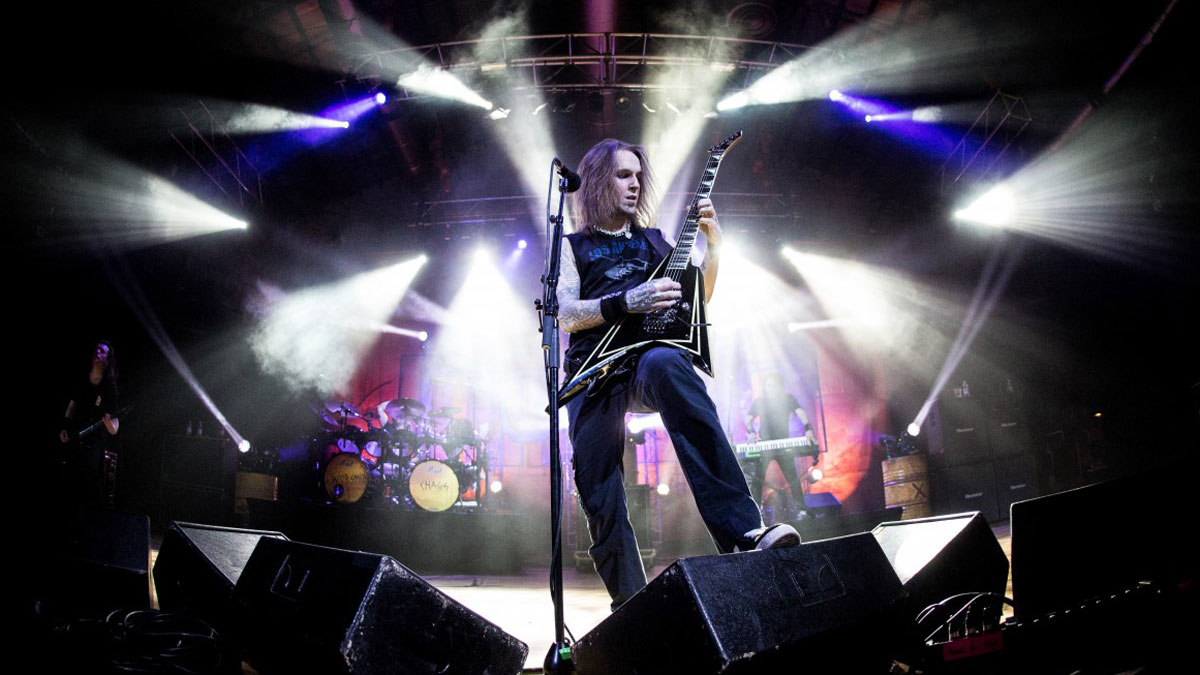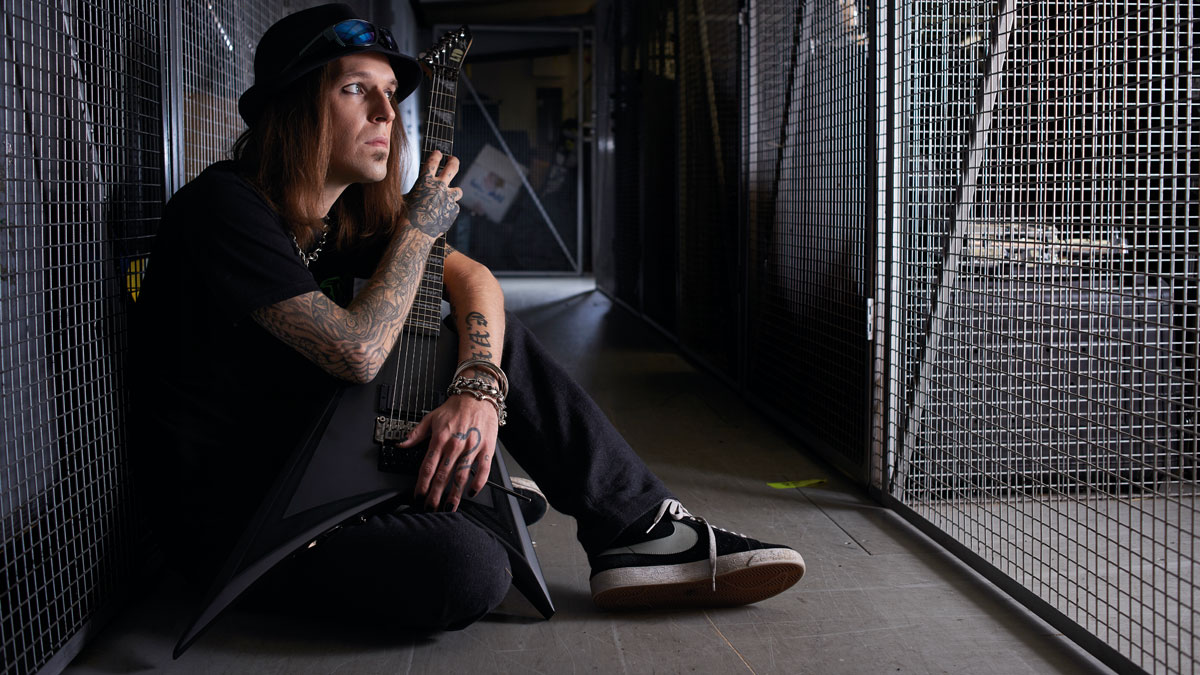Alexi Laiho on new Children Of Bodom album I Worship Chaos
Plus parting ways with Roope Latvala

Introduction
Not many bands could handle losing a guitarist of 12 years three days before recording an album. But then again, as singer/guitarist Alexi Laiho explains, Children Of Bodom aren’t your average band...
Before we get into it, we wanted to ask you about something that happened recently – you were commissioned to compose a piece that you performed with 100 other guitarists in Helsinki’s Senate Square. How did that come about?
Helsinki City Festival that actually approached me about doing100guitarsfromHel. It was a huge honour
“100guitarsfromHel was a very big thing for me! It was the Helsinki City Festival that actually approached me about doing it and not only was it a huge honour, but I was like, ‘What the hell, are you serious?!’ Because it’s a festival known for classical music and more upmarket art culture… and all of a sudden I was involved.
“They would not usually have anything to do with the likes of me, but it became the biggest jam of my life. I collected the core band, guys I wanted to play with, who each became one of the five section leaders. Then there would be 20 random dudes following their part of the song… it’s fucking insane when you think about it.”
What sound did you want to create when you were composing the piece?
All of a sudden there were deadlines for everything… I haven’t slept a lot lately!
“There were parts that were obviously metal, but also others that were maybe a little bit jazzy or bluesy. It definitely didn’t sound like Children Of Bodom. I love to mix it up and do different things.
“As a person, I get bored very easily! Not to say I’ll ever get bored with COB… just listen to our new record! But I was writing for the COB record at the same time as composing this piece. Plus there was another thing I had to do… it’s been a fucking crazy year thinking about it now.
“I have this 80s covers band in Helsinki called The Local Band and we just recorded an EP that’s going to be released in Japan and Finland. All of a sudden there were deadlines for everything… I haven’t slept a lot lately!”

Parting ways
This is the first COB album with just you on guitars. What made you part ways with long-serving guitarist Roope Latvala?
We want to have a stable lineup, we don’t like changing members, that’s just not our style
“Without going into too much detail, we’d just grown apart as people. All four of us were at a place where we wanted to push things harder and put more effort in on anything COB-related. He wasn’t quite there with us in terms of work ethics, so we figured it’d be better for everyone to part ways. So on one hand it was a sudden thing, but also kinda not.
“We want to have a stable lineup, we don’t like changing members, that’s just not our style. Maybe that works for other bands, but not us. Though he’d been with us for 12 years, it was time to move on.”
The announcement came just days before you entered the studio. Was it daunting having to handle all of the guitars at such short notice?
There wasn’t really time for anything to sink in. We just had to turn up and do it!
“Well it didn’t feel as different as people might think. When we parted ways with Roope, there wasn’t really time for anything to sink in. We just had to turn up and do it! Plus I had written all the riffs, so I didn’t have anything extra to learn.
“I was working a double shift… but I think the guitars sound a bit tighter. It makes sense for guitars to sound tighter if there’s just one guy playing all the parts. When I’m in the studio, I like trying out random ideas as I’m recording so it was cool to do that and not have to teach or explain what I’m doing to anyone else!”

Don't think too much...
You have Antti Wirman filling in as a live guitarist. What are the chances of him becoming a full time member?
“He’s actually our keyboard player’s brother and I think he’s an amazing player. He’s only filling in for the rest of the year so we don’t have to cancel any of our live dates. But he’s not a permanent member or planning to become one, so we’re working on finding a new guy. There are a couple of options we’re considering but nothing’s finalised yet! It’s very exciting though.”
Does it ever get hard to think outside of the box nine albums in? How do you find new sources of inspiration?
The only way to keep things fresh is to do things naturally and hope for the best!
“It seems like the only way for me to do that is to not think about it too much. I block everything out of my mind in terms of how we are supposed to sound, or how people are going to react. I can’t think of any of that stuff because it might throw me off track and I might write something that isn’t genuine or from the heart.
“The only way to keep things fresh is to do things naturally and hope for the best! That’s the only way to keep things fresh. It doesn’t mean you have to do anything drastic or change what you do… Music is about creating something that doesn’t exist. It’s also a bit like playing the lottery, you never know what’s going to happen! You know what you’re doing, but as far as the results – you never know.”

Kemper convert
So tell us more about the gear you used to get those heavy tones on I Worship Chaos?
“I wrote and recorded with the same gear – ESP guitars and Marshall amps. I stay with that sound because I know it works for me. But there were a few parts here and there where I used a Strat and Kemper Profiling Amp.
Sometimes I really have to sit down and play the riffs slowly. Then I’ll whisper the vocal line on top
“Dude, those things are amazing, especially for the clean sounds. The first time I tried one out, I couldn’t stop playing with it… it just sounded beautiful. I’m very old school when it comes to amps, but that thing? I see myself buying one for sure.
“I tried the distorted sounds, which I’m usually very picky with and was really impressed, even more so for not being a tube amp!”
Do you ever write parts that seem impossible to sing over at first, ideas that take hours and hours of practice?
“I’m so used to it now, I’ve been doing this since I was 12 and I always wanted to sing and be a guitar player. But sure, sometimes I really have to sit down and play the riffs slowly. Then I’ll whisper the vocal line on top, just to get the rhythms. After a few times, you’ll start getting it down.
“It’s usually pretty easy for me, but then again I don’t know what day it is half the time! You know what, most people think doing the leads and singing is the hardest thing ever. And yeah, it can be tricky. But it’s actually harder to do the rhythm stuff because it’s just as fast and keeps looping round!”

Precision = practice
Looking back, as far as the neoclassical side of your lead playing is concerned, how did you master the techniques behind playing fast runs with such precision?
“It takes a lot of practice for sure, but sitting down with a metronome doesn’t kill the rock ’n’ roll vibe like some people think. You have to get the techniques down and then you can actually start playing. It’s a necessity before you do the main thing.
I’ve been on a huge Lindsey Buckingham trip recently and listening to his playing in Fleetwood Mac
“The rest is up to you, the rock ’n’ roll vibe will come from your personality. It can be aggressive or laid back or everything in between rolled into one. There are unlimited possibilities. I’ve always dug the whole 80s guitar vibe, guys like George Lynch… that’s what I grew up with. That’s in my heart and blood, but there’s more to me than just that.”
Being such an accomplished guitar player, what techniques have really challenged you in recent years? Is it hard to find challenges when you get to a certain point?
“This might surprise some people, but I’ve been on a huge Lindsey Buckingham trip recently and listening to his playing in Fleetwood Mac. I always thought there were two guitar players playing together, but it was just him doing all that Travis picking stuff. That’s how good he is! I thought, ‘You fuckin’ asshole, how is that possible?’
“So that’s actually something I’m still working on right now and, dude, it’s hard. Like a whole different sport. In many ways, it was the same drive I felt when I first saw someone sweep picking… I had no choice but to try and master it! If you keep your eyes open and observe, there’s always something out there to learn.”
Amit has been writing for titles like Total Guitar, MusicRadar and Guitar World for over a decade and counts Richie Kotzen, Guthrie Govan and Jeff Beck among his primary influences. He's interviewed everyone from Ozzy Osbourne and Lemmy to Slash and Jimmy Page, and once even traded solos with a member of Slayer on a track released internationally. As a session guitarist, he's played alongside members of Judas Priest and Uriah Heep in London ensemble Metalworks, as well as handling lead guitars for legends like Glen Matlock (Sex Pistols, The Faces) and Stu Hamm (Steve Vai, Joe Satriani, G3).


